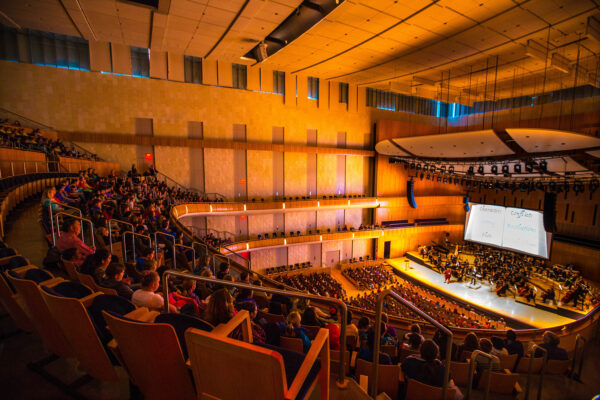
Find an escape at the Symphony
January 2, 2025
"The concerts transport me and give me sense that all is right with the world, and even though it is a fleeting illusion, I love experiencing this peace of mind."Wednesday, September 28
Associate Concertmaster Ahra Cho, Principal Cello Paul Ledwon, and Principal Keyboard Christi Zuniga sit down for an interview about their experience performing Beethoven's iconic Triple Concerto.

A triple concerto is not something that we hear often. We are more familiar with the sound of a traditional concerto in which one musician is highlighted in front of the orchestra. In the case of this season’s opening Symphony Joslyn concert at UNO, you will hear not one, but three soloists in front of the orchestra. Associate Concertmaster Ahra Cho, Principal Cello Paul Ledwon, and Principal Keyboard Christi Zuniga will take the stage in the performance of Beethoven’s iconic triple concerto.
All three musicians sat down to talk to us about the difficulty of learning each individual part, creating a consistent style between all three instruments, adding the rest of the orchestra to the equation, and other fascinating aspects that will undoubtedly supplement the joy of hearing this work live.
Christi: Paul and I played the triple concerto previously about five years ago in Wisconsin.
Ahra: I have only played this concerto’s first movement about 15 years ago when I was a student. So I'm happy to have the opportunity to play the entire piece with Paul and Christi.
Paul: The timing was a little strange because it's our first concert with the chamber orchestra after the summer. We had one rehearsal back in June where we got to know each other but mostly we've been practicing on our own. Now we have more rehearsals and we're all back in town after the summer.
Ahra: It was a great start - we matched our musical ideas, bowings, phrases, and balance before we met with the orchestra.
Christi: One of the big challenges is just knowing that I'll be playing a different piano with which I may not have a lot of time, but I know that it's a Steinway so I'm happy about that. And I practice at home on a Steinway. That’s always kind of a consideration for a pianist.
Ahra: For me, the most challenging thing is the balance. Sometimes in a triple concerto we must blend together but, in some sections, we have to diverge to highlight each line. I must think about how I can support the high melody line and maintain the character.
Paul: This piece is quite difficult for the cello part, in particular. Most of it is in a very high register and there are a lot of fast parts and big shifts coming out of nowhere. I love this piece so much because it’s quintessential Beethoven and you know it right away when you hear it. He didn’t write a cello concerto so I’m glad that the cello has a part in this wonderful work.
Paul: It’s not exactly like a regular concerto where there's just one soloist. You're interacting with the orchestra differently because in this piece, it feels like we're a trio that has more interplay with each other. In a typical concerto, the interplay happens between the soloist and orchestra.
Christi: And there are a couple of places where two of us will have our own duet while the other solo instrument accompanies. It feels very much like chamber music at that point.
Ahra: At times, you’ll think that you’re listening to a violin concerto, then it’ll switch to a cello concerto and then suddenly, it’s a piano concerto. It’s really fun in that way.
Christi: This differs from just performing a solo concerto by one aspect. We have to really be in tune with each other. We must play very well together and know each other’s parts. Of course, we still need to know the orchestra part and feel very comfortable with that but also knowing each other’s part is what makes the triple concerto so challenging.
Ahra: I agree with Christi. So that's the difference between a solo concerto and a triple concerto. I try to learn every part of each section
Christi: My favorite part of the concerto is the first movement. I just love the way Beethoven put several variations on the theme, but not total variations. The orchestra comes up with the theme and then it moves from one soloist to the next and they'll each add just a little ornamentation to it each time. It's just a fun movement.
Ahra: My favorite is the second movement. I like the cello part. Paul plays the melody first, and then I join in the melody with my voice. We blend together … This part reminds me of the sun rising in the morning.
Paul: One of my favorite parts of the piece is the transition from the second movement into the third movement. It goes from the slow lyrical melody and then the cello takes over and gets faster and faster. And then suddenly, there's the third movement which I love because it's a Polonaise. This moment is so special to me because I've been dancing [the Polonaise] and attending Polish dance class since I was about four years old. One of my favorite things about this piece is just being able to play it.
Paul: This is a masterwork of humanity, really. In my opinion, Beethoven is one of the greats and it’s just a privilege and honor to be able to preserve this art-form and share it with people. And hopefully it touches them in the same way that it touches us.
Love the Omaha Symphony?
Be the first to learn about new concerts, stories, and special offers.